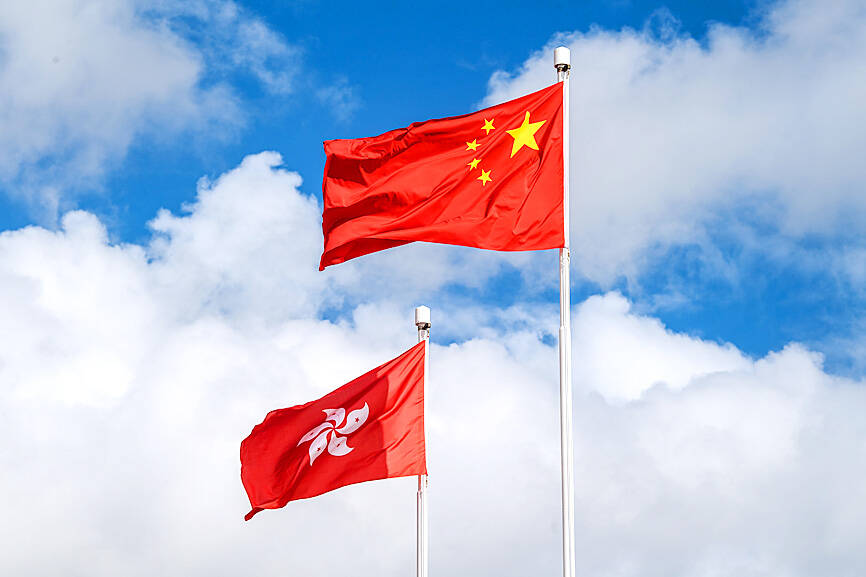Chinese President Xi Jinping (習近平) is launching a purge of the country’s military, a report on China released on Monday by the Mainland Affairs Council (MAC) said.
Xi and other high-ranking government members this year toured the country to gain a better understanding of the country’s defense, high-tech industries and the stability of its borders, while the government stepped up anti-corruption efforts in the military, sports and healthcare, the report said.
China’s judicial and political systems are also working to tamp down public dissent, it said.

Photo: AFP
Xi’s new purge of the ranks of the military has already begun, with many members of the Central Military Commission’s equipment development department and the Chinese People’s Liberation Army (PLA) Rocket Force being arrested, the report said.
The report also said that PLA exercises with new aircraft carrier task force groups near Taiwan are focused on controlling the Taiwan Strait and preventing the US and Japan from intervening if China attacks Taiwan.
Outside of the military, the Chinese Communist Party (CCP) is implementing Xi’s concepts of Chinese cultural primacy in its education policies, while emphasizing political loyalty, the report said.
The party is also touting efforts to promote the independence of scientific and technological research, it added.
Meanwhile, Xi glossed over the severity of flooding in northern China from July to September, focusing instead on hailing the government’s response, the report said.
Economically, China’s growth in the first three quarters of this year was 5.2 percent, with the expansion of its domestic market the main driver of its recovery, it said.
The Chinese producer price index fell 3.1 percent, and its consumer price index only increased by 0.4 percent during the nine-month period, highlighting the potential for deflation, it said.
Total foreign trade in goods fell 6.4 percent year-on-year for the first three quarters, while exports dropped 5.7 percent annually and imports fell 7.5 percent.
As of September, China had a 5 percent unemployment rate in cities and towns, with a 5.2 percent unemployment rate in major cities, the report said.
The Chinese National People’s Congress is to step up efforts to monitor government debt, it added.
Regarding social stability, people are protesting an ongoing crisis over cash-strapped developers not finishing housing complexes, while the expansion of China’s counterespionage law, which went into effect on July 1, has spurred efforts to apprehend “spies,” the report said.
Meanwhile, the CCP is launching purges in Xinjiang, while the international community remains concerned over human rights abuses in the region and in Tibet, it said.
Regarding Hong Kong and Macau, the number of people registering as first-time voters in the territories fell 50 percent this year, it said.
The Hong Kong government said its economy grew 1.5 percent in the second quarter, spurred by a thriving tourism industry and increased expenditures in the private sector, the report said.
Macau’s government proposed amendments to election laws, which are expected to passed before the end of the year, it said.

Chinese Nationalist Party (KMT) Chairman Eric Chu (朱立倫), spokeswoman Yang Chih-yu (楊智伃) and Legislator Hsieh Lung-chieh (謝龍介) would be summoned by police for questioning for leading an illegal assembly on Thursday evening last week, Minister of the Interior Liu Shyh-fang (劉世芳) said today. The three KMT officials led an assembly outside the Taipei City Prosecutors’ Office, a restricted area where public assembly is not allowed, protesting the questioning of several KMT staff and searches of KMT headquarters and offices in a recall petition forgery case. Chu, Yang and Hsieh are all suspected of contravening the Assembly and Parade Act (集會遊行法) by holding

PRAISE: Japanese visitor Takashi Kubota said the Taiwanese temple architecture images showcased in the AI Art Gallery were the most impressive displays he saw Taiwan does not have an official pavilion at the World Expo in Osaka, Japan, because of its diplomatic predicament, but the government-backed Tech World pavilion is drawing interest with its unique recreations of works by Taiwanese artists. The pavilion features an artificial intelligence (AI)-based art gallery showcasing works of famous Taiwanese artists from the Japanese colonial period using innovative technologies. Among its main simulated displays are Eastern gouache paintings by Chen Chin (陳進), Lin Yu-shan (林玉山) and Kuo Hsueh-hu (郭雪湖), who were the three young Taiwanese painters selected for the East Asian Painting exhibition in 1927. Gouache is a water-based

Taiwan would welcome the return of Honduras as a diplomatic ally if its next president decides to make such a move, Minister of Foreign Affairs Lin Chia-lung (林佳龍) said yesterday. “Of course, we would welcome Honduras if they want to restore diplomatic ties with Taiwan after their elections,” Lin said at a meeting of the legislature’s Foreign Affairs and National Defense Committee, when asked to comment on statements made by two of the three Honduran presidential candidates during the presidential campaign in the Central American country. Taiwan is paying close attention to the region as a whole in the wake of a

OFF-TARGET: More than 30,000 participants were expected to take part in the Games next month, but only 6,550 foreign and 19,400 Taiwanese athletes have registered Taipei city councilors yesterday blasted the organizers of next month’s World Masters Games over sudden timetable and venue changes, which they said have caused thousands of participants to back out of the international sporting event, among other organizational issues. They also cited visa delays and political interference by China as reasons many foreign athletes are requesting refunds for the event, to be held from May 17 to 30. Jointly organized by the Taipei and New Taipei City governments, the games have been rocked by numerous controversies since preparations began in 2020. Taipei City Councilor Lin Yen-feng (林延鳳) said yesterday that new measures by